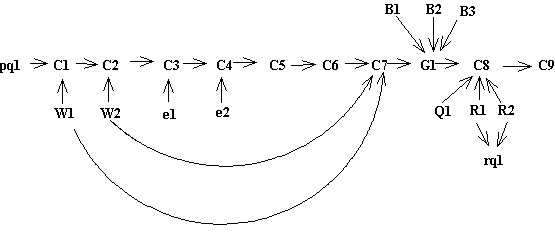| <
back to the main view > |
||||||||||||||||||||||||||||||||||||||||||||||||||||||||
|
Analysis of Reasoning, Rhetoric and Argumentation (ARRA) Both science and democracy are based on reasoning, reasoned argumentation and reasoned rhetorical persuasion based on evidence and justifications. However most textbooks are very dogmatic collections of claims about the World. In order to show this explicitly and to promote writing of better educational texts I developed 'Analysis of Reasoning, Rhetoric and Argumentation' (ARRA) (Åhlberg 1991, 1993, 1996, 1998a - 1998c). Originally I started to develop it from ideas presented by Toulmin (1958). There is continually R&D work going on for testing and improving ARRA and to apply it new fields. ARRA is nowadays a quality tool for monitoring and promoting quality of reasoning, rhetoric and argumentation. The basic categories of ARRA are in the Table 1. Table 1The basic categories of the improved argumentation analysis (Analysis of Reasoning, Rhetoric and Argumentation, or shortly ARRA).
References: Åhlberg, M. 1991. Concept mapping, concept matrices, link tables and argumentation analysis as techniques for educational research on textbooks and educational discourse and as tools for teachers and their pupils in their everyday work. In Julkunen, M.-L., Selander, S. & Åhlberg, M. 1991. Research on texts at school. University of Joensuu. Research Reports of the Faculty of Education N:o 37, 89 - 154. Åhlberg, M, 1993. Concept maps, Vee diagrams and Rhetorical Argumentation (RA) Analysis: Three educational theory-based tools to facilitate meaningful learning. Paper presented at The Third International Seminar on Misconceptions in Science and Mathematics. August 1- 5, 1993. Cornell University. Published digitally in the Proceedings of the Seminar, http://www.mlrg.org/proc3abstracts.html (Read 26 2. 2003.) Åhlberg, M. 1996. Tutkiva opettaja oman teoriansa kehittäjänä ja testaajana. [Inquiring teachers as developers and testers of their own theories]. In Ojanen, S. (toim.) Tutkiva opettaja 2. Helsingin yliopiston Lahden tutkimus- ja täydennyskoulutuskeskus, 71-86. Åhlberg, M. 1998a. Kestävän kehityksen pedagogiikka ja yleisdidaktiikka. University of Joensuu. Bulletins of the Faculty of Education. N:o 71. Åhlberg, M. 1998b. Ecopedagogy and ecodidactics: Education for Sustainable Development, Good Environment and Good Life. University of Joensuu. Bulletins of the Faculty of Education. N:o 69. Åhlberg, M. 1998c. Education for sustainability, good environment and good life. In Åhlberg, M. & Leal Filho, W. (Eds.) 1998. Environmental education for sustainability: good environment, good life. Frankfurt am Main: Peter Lang, 25 - 43. Lomborg, B. 2001. The Skeptical Environmentalist: Measuring the Real State of the World. Cambridge: Cambridge University Press. Lynas, M. 2003. Natural Bjorn killer.
Ecologist 33(2), 26 -29.
|
||||||||||||||||||||||||||||||||||||||||||||||||||||||||
< back to the main view > |
||||||||||||||||||||||||||||||||||||||||||||||||||||||||
